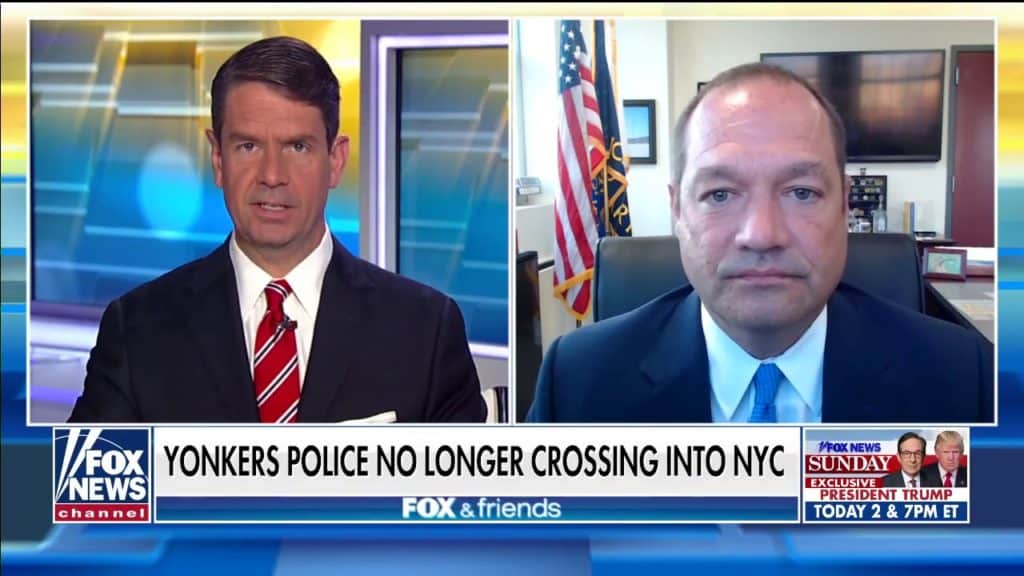
Yonkers Law Enforcement Won’t Go Into NYC Because of New Chokehold-Knee Law
By Dan Murphy
A New York City law that calls for the jailing and fining of any police officer that puts a knee on a person’s back or chest during the course of an arrest has resulted in several Westchester law enforcement agencies from ordering their officers not to pursue suspects into New York City.
Yonkers Police Commissioner John Mueller made the announcement last week, prohibiting officers under his command from taking enforcement actions in the City of New York effective immediately.
Mueller explained that while he supports bannng any chokeholds of persons under arrest, in certain situations placing a knee on a suspect who is resisting or is mentally ill, may be necessary. “The New York City law is calling for perfection. I am in 100% agreement that chokeholds should be banned. But police officers need some tools to place persons who are resisting under arrest.”
Yonkers has long banned the use of chokeholds by its Police Department except in life or death struggles, and has engaged in a variety of practices to minimize the use of force during arrests. As a result, complaints of excessive force by Yonkers Police have dropped dramatically in recent years. Only six such complaints were made last year.
“Despite our best efforts to minimize the use of force, it remains well possible that a police officer’s knee may end up on the chest or back of a violent suspect during a scuffle or arrest, especially during a one-on-one situation,” said Mueller, “We will not subject our officers to the threat of a year in jail every time they have to deal with a violent or mentally ill subject resisting arrest. New York City’s new law goes beyond effective policing. It jeopardizes the safety of both police officers and the public.”
Mueller added that it was important to note that this was in no way a reflection on the NYPD: “The Yonkers Police Department has and will continue to have the utmost respect and admiration for the men and women of the NYPD. The NYPD has been placed in a nearly impossible position by its legislative body to deliver measured, thoughtful, and appropriate policing strategies for residents who need them most. Our brothers and sisters of the NYPD have contributed countless innovative and transformational policing strategies that have greatly benefited citizens and policing alike, throughout the entire world.”
The opposition from law enforcement in Westchester to the actions of Mayor Bill de Blasio and the New York City Council, “The New York City law was obviously not written by anyone who has ever had to put handcuffs on a violent individual resisting arrest. The Yonkers Police does not use chokeholds or engage in other actions that endanger a subject’s life, but nor can we endanger an officer’s own life; and we’re certainly not going to ask them to risk going to jail just for doing their job,” said Commissioner Mueller, who explained that Yonkers Police, even when engaged in an active pursuit, will halt at the New York City line in the future absent extreme circumstances, or an emergency.
Yonkers Mayor Mike Spano said he supported Commissioner Mueller’s order. “Here in Yonkers our Police Department works closely with the community, and the low number of complaints is the result of that. We don’t use chokeholds, and we don’t use more force than absolutely necessary, even when dealing with individuals who are extremely violent or suffering mental distress.”
The New York State Sheriff’s Associatoin has also begun to push back against “the atmosphere of disrespect for law enforcement being promoted or tolerated in so many quarters today,” by proposing state laws which would discourage harassment and physical attacks against the police and encourage compliance with the lawful orders of the police engaged in enforcing the criminal laws of New York.
“Unfortunately, many politicians and community activists, and some in the media, have fostered an attitude toward the police which excuses, or even glamorizes, resistance to lawful authority. It should be readily apparent to everyone that, with some notable exceptions, most of the recent tragic incidents which resulted in the injury or death of an individual at the hands of the police have begun with refusal by that individual to comply with a lawful order. When an individual refuses to comply with a lawful order, the police officer is faced with a choice between walking away from the wrongdoer or taking some action.
Action often leads to reaction, and escalation begins. Officers are trained in deescalation, but that requires some cooperation on both sides. When escalation begets escalation, tragedy can result. An officer’s split-second reaction to a perceived threat may perhaps later be thought to be all wrong by those sitting in their arm chairs, under no pressure or stress, but police officers do not often have the luxury of cool reflection before taking action.
Commissioner Mueller appeared on Fox News last weekend. “It’s a very sad day. I never thought we’d see this in my time in policing.”You’re seeing a lot of different agencies that surround the five boroughs following suit.” When asked about the City Council’s decision to pass this law, Mueller said,, “I would characterize it as nothing short of reckless and irresponsible.”
NYPD Commissioner Dermot Shea said on CNN that the six police reform bills signed by New York City Mayor Bill de Blasio Wednesday are “handcuffing the police.”





